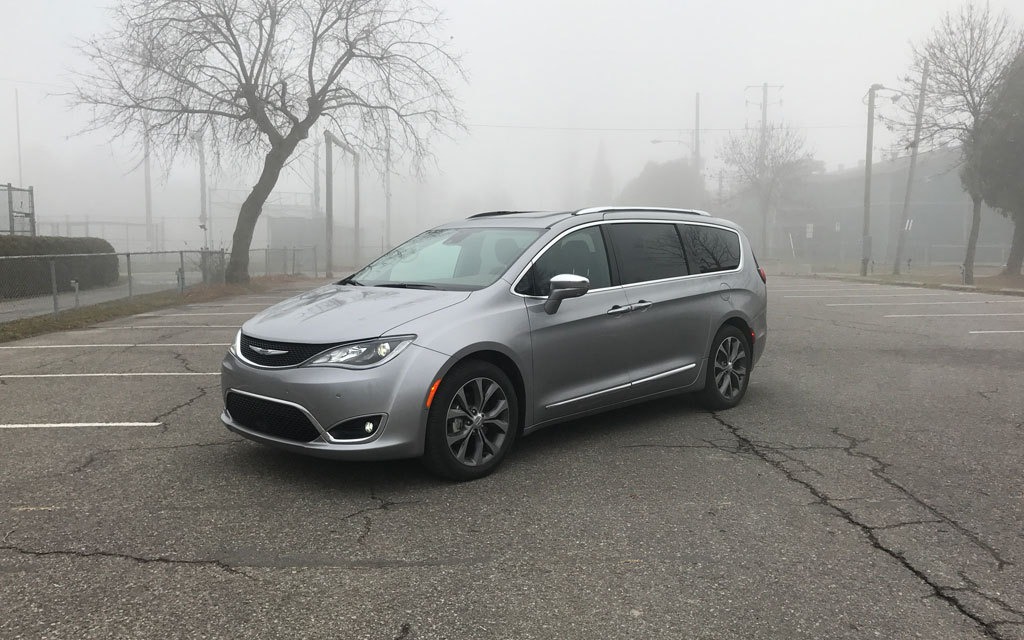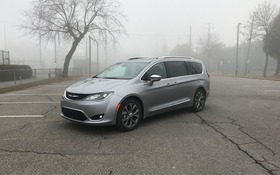2017 Chrysler Pacifica: the New Standard in Family Hauling

| Strong points |
|
|---|---|
| Weak points |
|
The 2017 Chrysler Pacifica is the sixth generation of the company’s original minivan that pioneered the entire segment when it was released back in 1983. Announced during the 2016 Detroit Auto Show, Fiat Chrysler Automobiles surprised many by also announcing that the Pacifica would replace both the Chrysler Town & Country and the less-expensive Dodge Grand Caravan.
It was an interesting move, because the Caravan is sold as a budget-minded, entry-level minivan and the Town & Country the higher-end version. The new Pacifica is decidedly a high-end minivan, which means we’re bidding adieu to the days of the $20,000 family hauler. I can’t say I’m thrilled by this because as a Grand Caravan owner myself, the lower price of the vehicle compared to most SUVs was a big plus for me, as I’m sure it was for many other young families.
- Also: 2017 Chrysler Pacifica Hybrid: For the Treehugging Family
- Also: The 2017 Chrysler Pacifica Hybrid qualifies for maximum green-vehicle rebates
The name may sound familiar because Chrysler sold a crossover called the Pacifica from 2004 to 2008, but there is nothing at all relating these two vehicles. The new minivan also has little in common with the outgoing models, having been completely redesigned from the ground up on a new platform.

Chrysler’s new design language translates quite well for a minivan, with sculpted lines and an attractive silhouette. The Pacifica's sliding door track lines are hidden under the rear-quarter side glass, making them almost invisible. With its long wheelbase, wide track, low stance and optional 20-inch wheels, the Pacifica has a sporty aura—as much as is possible for a minivan.
The body structure is lighter and stiffer, making it more responsive with less body roll and improved agility. Chrysler has also taken great pains to reduce noise and vibration for the occupants, including having Active Noise Cancellation as a standard feature. ANC uses the vehicle’s audio system to emit sound waves at frequencies that counteract common road and wind noise. So does all this technology actually work?
Overwhelmingly, I can say that it does.
From the minute I started driving the Pacifica I was impressed at how sturdy, rigid and solid it felt compared to my Grand Caravan. Now obviously mine has a little more wear and tear after 100,000 kilometres, but the contrast was still striking. The Pacifica drove like an SUV which is a first for a minivan in my book. It felt much more in tune with the road and gave me more confidence in general, especially in corners and embankments.
The van weighs about 115 kilograms (250 pounds) less than the outgoing Town & Country and Grand Caravans, but feels as if it weighs even less. Acceleration from the 3.6-litre Pentastar V6 engine is smooth and adequate, but I’m fairly certain that most Soccer Moms and Dads aren’t steadfastly concerned about their quarter-mile times so adding more power is probably not at the top of the company's to-do list.
The interior is where the Pacifica impresses even more so than the handling. It is quite simply light-years ahead of where it was in almost every aspect, and keep in mind the Grand Caravan and the Town & Country were already among the best. The fat, two-tone grey/brown leather steering wheel is a thing of beauty as is the new dash layout. Ergonomically there isn’t anything that bothered me, but I’m still not sold on the rotary dial gearshift knob. I like shifting, I like to rest my hand on the shifter. I like the instantaneous response of a mechanical device, but I get the move toward smaller, more efficient controls. After a while I got used to it.
The Stow ‘n Go operation is improved and requires less effort to complete the operation and even comes with a button on the B-pillar to advance the front seat in order to complete the operation—trust me, this is huge. The interior is very spacious and comfy with many notable improvements, including five places where you can attach a baby seat with the LATCH anchors, a RIDGID Stow ‘n Vac built-in vacuum cleaner and Easy Tilt second-row seats.
The all-new Uconnect Theater entertainment system, which uses a seven-inch full-color driver information display, 8.4-inch touchscreen and dual rear screens, is another reason why the Pacifica outshines the competition. Nobody beats Uconnect nowadays. It’s simply the best and most user-friendly system on the market.

Where I think designers dropped the ball was the switch to dual screens. It’s great if you have two kids, but what if you have three or four? I’d much rather have a big screen fold down from the roof for all occupants rather than a pair of screens. At least they didn’t’ try to overcomplicate the DVD playback for the rear although it’s one thing that my 2011 still does better. You’d be amazed at how idiotically complicated some other rear-seat entertainment systems have become. Some are so bad that it’s as if engineers never actually had a family test it out. Fortunately, that’s not the case here.
The family had a great time during our week with the Pacifica. I enjoyed driving it and the kids enjoyed riding in it. For the photo shoot, I decided to do something a little different and enlisted the help of my son’s daycare. They allowed me to park in the backyard and brought out a few of the classes for pictures. My son was so excited to able to show his friends the new van and given that there are at least five Grand Caravan/Town & Country owners among the parents, the Pacifica generated a lot of interest among them as well.
All of this greatness does come at a price, however. Whereas the old Caravans were routinely advertised for just over $20,000 after heavy discounts, the Pacifica starts at $37,995 before freight and delivery charges for the base LX trim, and tops off at $52,995 for the top-of-the-line limited version. This puts it above the Honda Odyssey ($31K to $49K), the Toyota Sienna ($34K to $49K) and the Kia Sedona ($28K to $42K), making it the most expensive minivan on the market (yes, there are only four left).
This is a risk for Chrysler because both the Honda and Toyota are known for their impeccable (borderline canine) reliability where FCA is not. That being said, there is no question that the performance and features of the Pacifica merit a hefty asking price, so if they improve on the reliability front, the Pacifica will leave the others in the rearview mirror.











